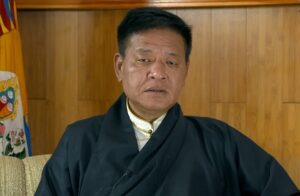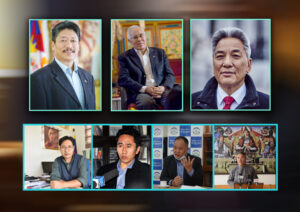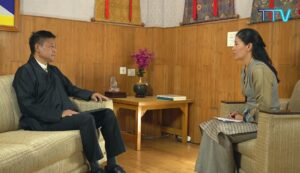
Sikyong Penpa Tsering
Photo: Screengrab
Sikyong Penpa Tsering, President of the Central Tibetan Administration (CTA) which is also known as the Tibetan Government-in-Exile, has outlined the main tasks performed by his administration since he assumed the role of Sikyong on May 27. He was speaking in an exclusive TV interview with Tibet TV.
Speaking about the strategic plans and policies he has planned out to resolve the long-standing issue of Tibet, Sikyong affirmed that his office will make sure to “resolve the Sino-Tibetan conflict based on non-violence and the Middle Way Approach espoused by His Holiness the Dalai Lama, endorsed by the Tibetan Parliament-in-Exile, and well received by Tibetans all over.”
There has been no Sino-Tibetan dialogue since talks stalled in 2010.

New committee members and three advisors
Photo: Vot.org
In an effort to resuming Sino-Tibetan dialogue, Tsering said he has taken the first step by dissolving the existing Task Force on Sino-Tibetan Negotiation and “replacing it with a restructured committee”. While expressing appreciation of the work of the previous Task Force team, he said the changes he has made were necessary. He continued, saying “The new committee consists of four members, each from a specific department of the CTA, that are pertinent to the task. The Department of Security besides its primary functions is assigned the job of sourcing relevant information from inside Tibet. Similarly, the Department of Information and International Relations (DIIR) has been assigned the job of sourcing news from around the world, and the Tibet Policy Institute (TPI) of the CTA is to conduct analytical research on the information gathered by the Department of Security and DIIR. Likewise, a political secretary has also been appointed who will lead the committee with the rest of the members”. Sikyong emphasised that until the Sino-Tibetan conflict is resolved, “the Task Force will be committed to highlighting the true situation inside Tibet and unmasking China’s distorted narrative of Tibet into the global community.”
Answering the question of whether China will resume the dialogue or not, “we are actually receiving positive signals from the Chinese side on the issue of dialogue. However, I am being cautious as we need to verify whether these signals are genuine and trustworthy,” said Sikyong.
He also mentioned that in order for the dialogue to take place, “the Chinese government should treat the Tibet issue as a conflict along with other issues like the Uyghur, Mongol and Hong Kong. If they have the political will, they can easily resolve it”.
Speaking about the current geopolitical situation of world’s changing attitude towards China since the Covid-19 pandemic started he said, “the geopolitical situation with regard to China in the world offers a unique and convenient opportunity for us Tibetans to seek support for the Tibet cause. We shouldn’t lose this chance”. In addition to the strong support from India and the United States, he focuses on building relationships with, and seeking support from, European countries in coming months.
The new Sikyong sees great opportunity in the large number of Tibetans living in various countries to increase and strengthen the Tibet advocacy and lobby campaigns across the world, and to this end he urges the younger generation Tibetans to lead the Tibetan freedom movement.
The challenges faced by Tibetan schools and monasteries were mentioned: there is a decreasing number of Tibetans in schools and monasteries in recent years; large numbers of Tibetans are migrating to Western countries from India and the sustenance of Tibetan settlements in India is another challenge for the future. Sikyong was asked what his plans are for these issues.

Sikyong with Tibet TV interviewer
Photo: Screengrab
Tsering responded that the Department of Education has data on Tibetan students enrolled in Kindergarten and K12 schools, and has collected data on children up to the age of three in all settlements. Based on the data collected, he said that it was shocking to see a drastic drop in the number of students in the period 2012 to 2021. He said that reasons for this could include the lack of Tibetans coming from Tibet since 2008 due to travelling restrictions and the difficulties of getting out of Tibet, as well that of Tibetans emigrating to other countries. The CTA has information only on the schools that they run; there are many private and autonomous Tibetan schools, including Tibetan Children’s Village (TCV) schools and Tibetan Homes Foundation Mussoorie School. To have a complete picture of the Tibetan students and school scenario, Sikyong plans to have a meeting with all school heads in near future to plan for the coming years.
For the sustenance of the Tibetan settlements, he said “there are about 45 Tibetan settlements in India. There are another 12-13 settlements in Nepal and 6-7 settlements in Bhutan. We have to assess the sustainability of these settlements in the future. Those small settlements, in particular [those] which have a slim chance of sustenance, should be merged with the larger Tibetan settlements. These are not short-term projects that can be completed in one or two years”.
It has been over three months since Tsering assumed the role of Sikyong and he has been unable to appoint members of the Kashag (cabinet) owing to the current and ongoing parliamentary impasse. Sikyong hopes that the issue will be resolved shortly, and says that his office is ready to provide any assistance and co-operation in whatever ways it can to resolve the impasse. If the parliamentiary crisis continues and parliament sessions are cancelled beyond March 31, 2022, there is a possibility that the CTA would have to close which would have a knock-on effect beyond the administration, affecting schools and many other institutions.
Sikyong Penpa Tsering has recently concluded his first official visit to Tibetan settlements in Ladakh and is currently on visit to Tibetan schools.




 Print
Print Email
Email